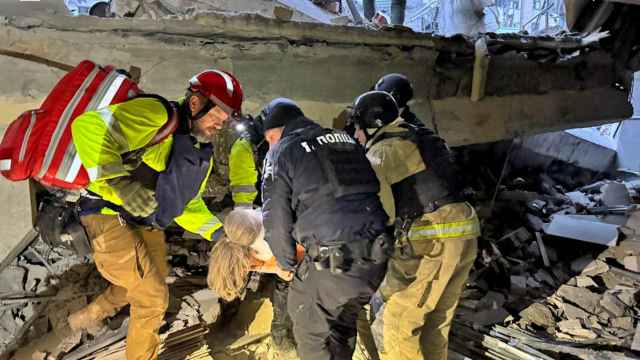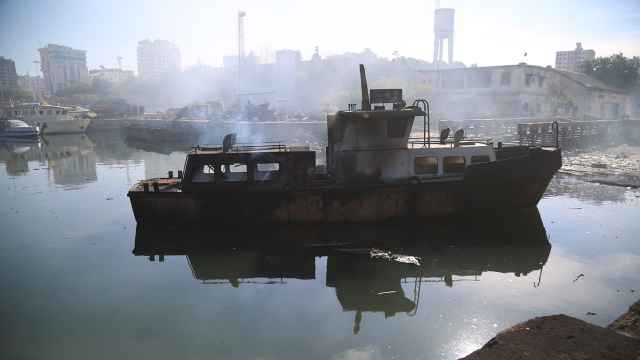Record heat and drought in Russia are curbing stock and bond trading as bankers flee Moscow to escape acrid smoke from wildfires east of the capital.
Fixed-income trades dropped by as much as 25 percent in the past five days, according to Metropol. Fewer sales of corporate bonds set the new issues market on course for its lowest third-quarter total since 2007, falling 26 percent from the same period last year, according to data compiled by Bloomberg. Transactions on the MICEX and RTS exchanges are as much as 60 percent below typical August levels, according to Otkritie Securities.
Russia’s most extreme summer weather has almost doubled Moscow’s normal death rate and caused wheat prices to soar as Prime Minister Vladimir Putin’s government declared a state of emergency in 28 crop-producing regions. JPMorgan and Alfa Bank canceled daily research reports yesterday because of concerns for the health of staff, while Deutsche Bank said it had sent nonessential workers home and advised bankers with a remote connection not to come to the office.
“It is impossible to work in Moscow right now,” said Semyon Odintsov, head of debt syndication at Metropol. “Many traders are working shorter hours or taking vacations earlier than planned.”
More than 104,400 people flew out of Moscow on Aug. 9, topping the previous 2010 record of 101,000, according to the Federal Air Transportation Agency. On Aug. 7, 95,000 left the city by plane, 20 percent more than the year-earlier date, agency spokesman Sergei Izvolsky said by telephone yesterday.
Reduced trading is providing profit opportunities, according to an Aug. 5 report by JPMorgan analyst Jonny Goulden. A rally in the government’s 10-year dollar debt reduced the extra yield investors demand to hold the notes rather than similar-maturity U.S. Treasuries to below the five-year spread for the first time on Aug. 3, according to Goulden.
The yield difference on 10-year notes was 190 basis points, or 1.90 percentage points, on Aug. 9, compared with 200 for five-year securities, according to data compiled by Bloomberg.
The relationship “makes little sense” and will probably reverse, Goulden wrote, citing the higher price of Russia’s 10-year credit default swaps relative to five-year swaps. The 10- year contracts traded at 167 basis points on Aug. 6, 12 basis points above five-year swaps, according to CMA. Relative valuations between Russia’s eurobonds have “seemingly left for vacation,” he wrote.
Moscow set a daily heat record of 35.5 degrees Celsius on Tuesday, the seventh such record this month and the 19th of the summer, according to the city’s weather service. The city reached 38.2 C, the highest ever, on July 29.
The heat and smoke caused the city’s death rate to increase to about 700 a day from 360 to 380 in normal conditions, said Andrei Seltsovsky, head of the city’s public health department, Interfax reported. Carbon monoxide and suspended particulate matter in Moscow’s air is at least twice as high as acceptable levels, Yelena Lezina, a spokeswoman for the state environmental monitoring agency, told Rossia-24.
Bond trading has dropped to 156 billion rubles ($5.2 billion) so far this month, from 1.12 trillion rubles during all of August last year, as some banks cut their working day, Odintsov said.
Russian companies have sold 94.4 billion rubles of bonds since July 1, compared with 127.8 billion rubles in the same period last year, Bloomberg data show as of today.
Trading on the benchmark MICEX Index of 30 stocks dropped to 21.6 billion rubles on Aug. 6, from 68.4 billion rubles on the same date last year, Bloomberg data show. The level was the lowest since July 9. Trading volumes rose to 26.4 billion rubles on Monday, the second-lowest so far this month.
VTB Capital has “several” Moscow-based bankers working from its London office, managing director Olga Podoinitsyna said.
“Bankers coming to Moscow for business have also being advised to stay away,” Deutsche Bank’s Moscow-based spokeswoman Marietta Nikolayeva said.
Alfa Bank in Moscow canceled its daily research notes until Aug. 12 as the office is operating on a “skeleton crew,” Isai Pochtar, an international sales manager, said in a phone interview while on vacation in Rochester, New York.
“There will be no daily until further notice because of the severe smog and health concerns,” said Derick Pearlin, head of equity trading at JPMorgan in Moscow. “A lot of the guys are working out of different offices in the Baltics, Sweden, Germany and London. The traders are holding the fort in Moscow because of the need to keep the systems going.”
But not all of Moscow’s bankers are evacuating the city. Tom Mundy, a strategist at Renaissance Capital, said the brokerage has a full working office. Renaissance and Otkritie said some staff were working longer hours because their offices had air conditioning.
“Despite working and living conditions becoming more repressive by the day in Moscow,” Citigroup’s trading and sales staff is “on ground in full effect,” John Heisel, an equity sales trader at Citigroup in Moscow, said Monday.
Simon Fentham-Fletcher, head of investment management at Raiffeisenbank, the Russian unit of Austria’s Raiffeisen International Bank Holding, said his approach on office attendance is based on the visibility of a billboard on Leninsky Prospekt, close to his office in Moscow.
“I judge the smoke on how well I can read the small print,” Fentham-Fletcher said by e-mail Monday. “I am letting nonessential staff stay at home.”
A Message from The Moscow Times:
Dear readers,
We are facing unprecedented challenges. Russia's Prosecutor General's Office has designated The Moscow Times as an "undesirable" organization, criminalizing our work and putting our staff at risk of prosecution. This follows our earlier unjust labeling as a "foreign agent."
These actions are direct attempts to silence independent journalism in Russia. The authorities claim our work "discredits the decisions of the Russian leadership." We see things differently: we strive to provide accurate, unbiased reporting on Russia.
We, the journalists of The Moscow Times, refuse to be silenced. But to continue our work, we need your help.
Your support, no matter how small, makes a world of difference. If you can, please support us monthly starting from just $2. It's quick to set up, and every contribution makes a significant impact.
By supporting The Moscow Times, you're defending open, independent journalism in the face of repression. Thank you for standing with us.
Remind me later.






